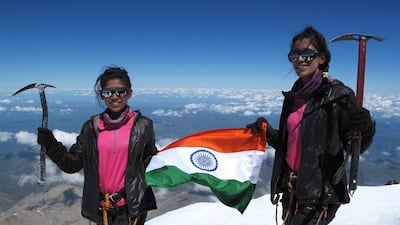While Indian prime minister Narendra Modi was probably mulling his recent speech urging his country to rid itself of what he derided as the “mental illness” of female foeticide, two Indian women were illustrating his point perfectly.
Tashi and Nungshi Malik, 23-year-old twins from Dehradun, skied to the South Pole in December, an expedition they launched to make a statement about the potential of girls. They braved temperatures of -30 degrees and each lost 6 kilogrammes in weight to become the first siblings to ski to the world’s southernmost point.
A few weeks earlier, they had climbed Mount Vinson, the highest peak in Antarctica. That, in turn, was the culmination of a series of expeditions that saw them complete what is known as the seven summits: standing atop the highest mountain on each continent.
None of this surprised me. I climbed the third of their seven summits with them, when they joined an expedition on Mount Elbrus, a 5,642-metre Russian volcano sited just far enough north of the Caucasus mountain watershed to qualify as Europe’s highest peak.
Admittedly, my group was feeling the disadvantage of having trained in the UAE’s 45-degree heat for a mountain that was 70 degrees colder. We reflected the limited mountain fitness that could be gained by repeatedly scaling the stairwells in my Abu Dhabi apartment building.
But Tashi and Nungshi were fit and acclimatised, having just climbed a 6,000m peak in the Indian Himalayas. It was clear that they were impressively determined and supremely fit and strong.
Their goal is simple: to use their example and their media exposure to spread the message about the importance of the girl child and to counter the cruel trend towards female foeticide.
The statistics from their homeland show how big their – and India’s – challenge is. Because of the widespread termination of female embryos, for every 1,000 boys born in India, there are just 918 girls. The figures are worst in Haryana, where there are just 837 girls for every 1,000 boys. Despite a 1994 law that bans ultrasound scans to determine the gender of a baby in the womb, the incidence of female foeticide continues to rise.
Tashi and Nungshi’s achievements mean that few can quibble with the view that women are capable of exceptional feats. But the cause of female foeticide tends to be more of a reflection of social conventions than the capabilities of girls and women.
Sons in Indian society have the role of looking after their parents, while daughters do so for the families of their husbands. In a society without the kind of social safety net enjoyed in many countries in the West and in the UAE, parents favouring sons over daughters is more a reflection of people seeking security in their old age than a belief in the merits of either gender.
But it is also less about poverty than is popularly believed. A 2011 survey shows that the incidence of female foeticide is increasing fastest in India’s most affluent states.
The twins’ own family experience defies this trend. Their father, Virender Singh Malik, is a retired colonel in the Indian Army who was in a sufficiently secure financial position to dedicate two years to support his daughters’ goal to complete the seven summits.
This doesn’t invalidate Tashi and Nungshi’s efforts. The indirect effect of their example is to prompt a national conversation in India about the practice. This is the context into which we should consider Mr Modi’s January speech and statements by his predecessor, Manmohan Singh, who called female foeticide “a national shame”.
As for the twins, they are already planning their next challenge both to show their capabilities and to raise publicity before they ski to the North Pole to complete what is known as the “Explorers’ Grand Slam” of the two poles and Mount Everest.
JHenzell@thenational.ae

